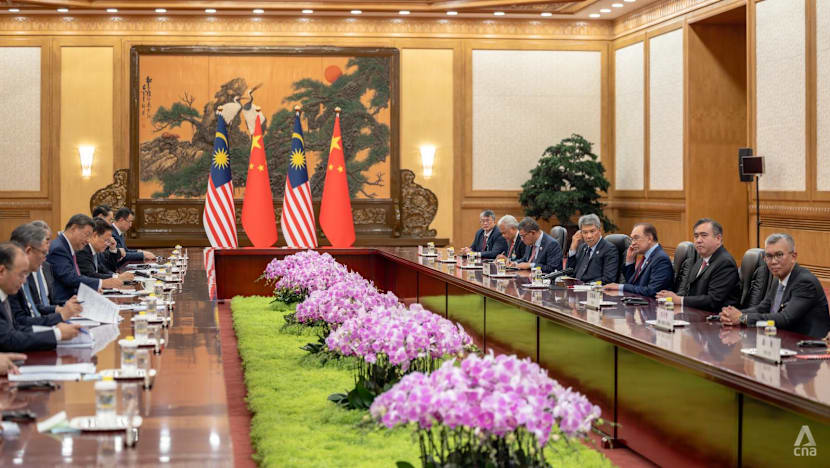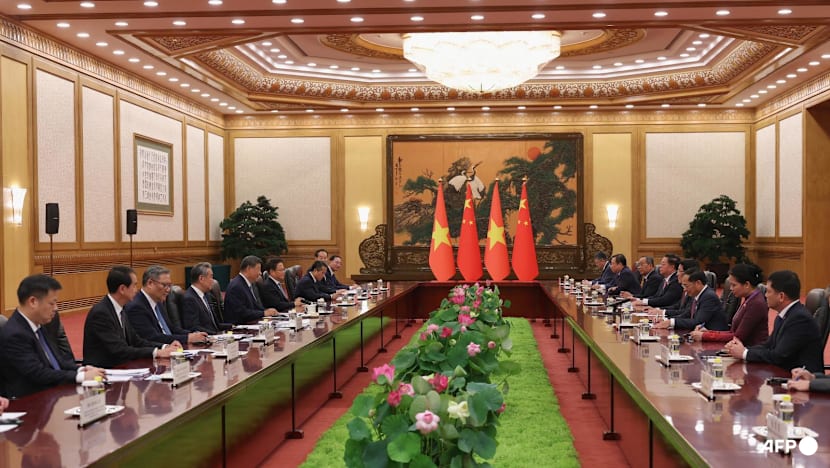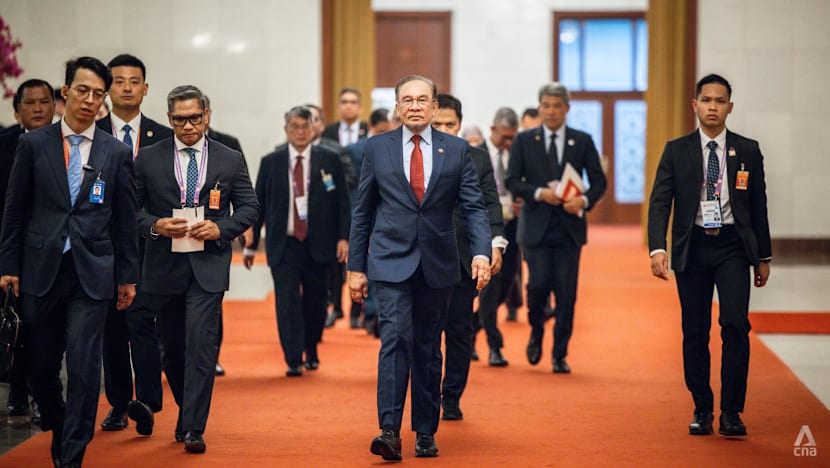China's Xi meets with ASEAN leaders amid stronger regional presence at WWII parade
Bilateral talks with leaders from Vietnam, Laos, Indonesia and Malaysia stressed closer economic cooperation and regional security - and in some cases, support for China’s Global Governance Initiative.

Malaysian Prime Minister Anwar Ibrahim, Chinese President Xi Jinping and their respective delegations hold bilateral talks at the Great Hall of the People in Beijing, China, Sep 2, 2025. (Photo: CNA/Hu Chushi)

This audio is generated by an AI tool.
BEIJING: Chinese President Xi Jinping has held bilateral meetings with a raft of Southeast Asian leaders on the sidelines of a grand World War II military parade in Beijing, which featured a stronger regional presence than at its last major commemoration in 2015.
Top leaders from Vietnam, Laos, Indonesia and Malaysia were among the 26 foreign heads of state and government at the Sep 3 parade in Tiananmen Square. The high-profile guest list included Russian President Vladimir Putin and North Korean leader Kim Jong Un.
Bilateral talks with leaders from the four Southeast Asian nations stressed closer economic cooperation and regional security - and in some cases, support for China’s Global Governance Initiative.
Xi met Vietnamese President Luong Cuong and Lao President Thongloun Sisoulith on Thursday (Sep 4) in separate meetings at the Great Hall of the People in Beijing.
In his meeting with Cuong, Xi said China and Vietnam should deepen exchanges in party and state governance, and organise activities marking the 75th anniversary of bilateral relations in order to benefit both sides, according to state media.
Xi also highlighted his Global Governance Initiative, adding that China is willing to work with Vietnam to safeguard the interests of the Global South. The Chinese supremo proposed the new initiative during the recent Shanghai Cooperation Organization (SCO) summit in Tianjin.
According to state media, Cuong said Vietnam firmly believes that China will play a greater role in regional and global peace and development. He said both sides should deepen cooperation and reaffirmed support in developing bilateral relations.

In talks with Laos’ Thongloun, Xi said the international and regional situation is undergoing complex changes, and both sides should view and manage bilateral relations with a “long-term perspective and strategic thinking”, according to state news agency Xinhua.
While highlighting progress in the China-Laos partnership, Xi also called for closer cooperation on regional security and law enforcement, including continued crackdowns on cross-border gambling and telecommunications fraud.
Thongloun, in turn, thanked China for its long-standing support and said relations were at their best. He pledged to advance the China-Laos Economic Corridor and voiced support for Xi’s Global Governance Initiative, expressing Laos’ willingness to strengthen cooperation with China on the international stage, Xinhua reported.
MEETINGS WITH PRABOWO AND ANWAR
On Wednesday, Xi met with Indonesia’s Prabowo after the military parade. Prabowo had earlier cancelled his visit to China over deadly protests at home, but eventually departed for Beijing on Tuesday evening.
According to a Chinese foreign ministry readout, Xi said Prabowo’s appearance in China despite “difficulties” showed the importance he attached to bilateral relations.
“China supports President Prabowo’s governance, Indonesia’s restoration of order and stability as soon as possible, and the development and growth of Indonesia,” said the readout.
Xi said both sides should enhance cooperation in areas such as critical minerals, digital economy, artificial intelligence, agriculture and fisheries.
As major Global South nations, China and Indonesia should also “jointly oppose unilateral bullying” and safeguard regional peace and stability, he said.
According to the foreign ministry readout, Prabowo shared information on the situation in Indonesia, “noting a trend of stabilisation”.
Prabowo further said relations with China are a high priority in Indonesia’s foreign policy, adding that the bilateral relationship is “at its best in history” and that Indonesia is looking forward to strengthening cooperation with China in fields like trade, investment, finance and infrastructure, noted the readout.
Both leaders also discussed a plan to build a wall along the northern coastline of Java island, a project Jakarta has floated to curb flooding and rising sea levels, Prabowo’s office said on Wednesday.
Prabowo's government has previously said the project would take 15 to 20 years to build and cost about US$80 billion.
Earlier this year, Indonesia's Coordinating Minister for Infrastructure and Regional Development Agus Harimurti Yudhoyono asked for technical and financial support when he met Chinese Vice Premier Ding Xuexiang in Beijing.
On Sep 2, Xi met Malaysian Prime Minister Anwar Ibrahim in Beijing, reaffirming the closeness of China-Malaysia ties.
Xi said the bilateral relationship should focus on a more “high-level and strategic” partnership, with deeper coordination and firm support for each other’s core interests, according to a Chinese foreign ministry readout.
According to the readout, Xi said both countries should work together to become “an inspiring example of cooperation” on high-quality development in the region, with new highlights in areas such as AI and semiconductors, while ensuring the high-level development of key projects such as the East Coast Rail Link.
Meanwhile, Anwar signalled support for Xi’s Global Governance Initiative, saying that it features both advanced ideas and practical solutions, and is of “great significance” for enhancing global governance, the readout noted.

Separately, Malaysian news site The Star quoted Anwar as saying that during their Tuesday meeting, Xi also stated support for accelerating Malaysia’s bid to join the BRICS grouping.
Malaysia formally applied to join BRICS in July 2024, and was announced as one of the bloc’s new partner countries in October 2024.
"President Xi stated his full support for accelerating Malaysia's participation as a full member of BRICS. This is a great honour and a sign of support for our country to continue playing an important role on the world stage," Anwar told Malaysian media during his visit to China.
The flurry of bilateral diplomacy with Southeast Asian leaders on the sidelines of the parade followed similar outreach at the SCO summit days earlier in Tianjin, where Xi also met Cambodian Prime Minister Hun Manet, Vietnam’s Prime Minister Pham Minh Chinh and Myanmar military chief Min Aung Hlaing.
Analysts have said the back-to-back events highlighted China’s convening power, giving Xi a platform to reinforce ties with neighbouring states while promoting Beijing’s vision of a more multipolar global order.














